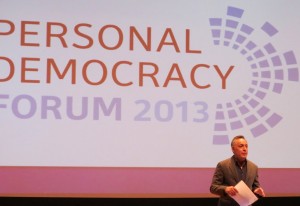 |
| Andrew Rasiej on Stage at the 10th Annual Personal Democracy Forum |
Sandwiched in between the 10th anniversary gathering of the Personal Democracy Forum, the annual who’s who of those intersecting technology, politics and social activism, and the inaugural Mayoral NYC Tech Forum where four of NYC’s mayoral candidates attempted to show off their technology chops — no Quinn, Thompson or Catsimi-whatsits — I was able to snag a seat at the (always) SRO New York Tech Meetup.
All three events, btw, have in common the inimitable and indefatigable Andrew Rasiej who was once a tech-driven NYC mayoral candidate himself.
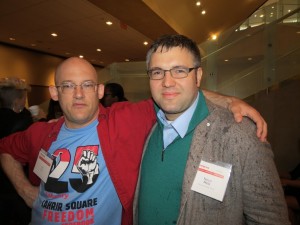 |
| At PDF: NYU’s Clay Shirky & Harvard’s Nicco Mele |
At PDF, founded by Mr. Rasiej and Micah Sifrey, I ran into a number of old friends and acquaintances including Nicco Mele whose new book The End of Big is getting buoyant reviews — Yes, Nicco, I bought a copy — Sunlight Foundation‘s Ellen Miller who couldn’t be busier right now with all the news-making revelations on the affront to citizen privacy, Microsoft’s innovation man in the Beltway Dr. Mark Drapeau (aka Cheeky_Geeky), and Craig Newmark who is always doing some good for someone through his CraigConnects. Craig’s latest, a crowdfunding campaign called Veterans Charity Challenge, will donate $100,000 to organizations that support veterans and their families. It runs through July 3.
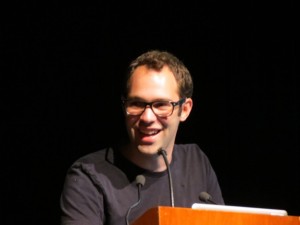 |
| Brandon Diamond Intros “Hack of the Month” |
I missed the Mayoral Tech Forum, but enjoyed this month’s New York Tech Meetup in spite of the absence of the event’s usual co-toastmaster Nate Westheimer who was away on business. (Nate, Jessica did a great job soloing. For that matter, so did Brandon Diamond. You better watch your back.)
Here’s a subjective take on the ten tech entre[preneurs showcasing their wares. I appreciated the efforts of Stash to catalogue and make discoverable events in our city, though it seemed like a Herculean effort that’s been tried before.
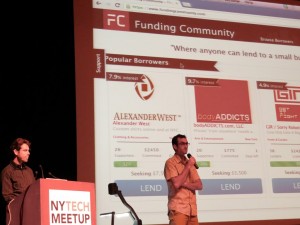 |
| Funding Community’s Alex Binkley and Aryeh Goldsmith |
Funding Community took a different twist on the booming crowdfunding platform landscape. Investors actually invest in existing small business and receive a percentage return on their investments. See.me is another crowdfunding platform, but with a specific focus on supporting the artistic community. Whereas IndieGoGo and Kickstarter host all sorts of campaigns, See.me has built a very visual Pinterest-like potpourri of art-driven projects seeking crowd support. The nichification of crowdfunding?
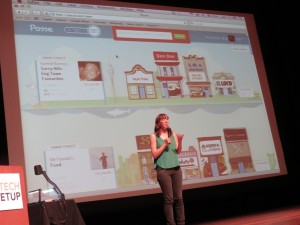 |
| Possie’s Founder from Oz, Rebekah Campbell |
I liked Posse, which looks to activate local NYC merchant engagement with geo-socially driven New Yorkers through perks for checking in or posting something nice. It lets users create colorful avenues of their fave joints, and has a successful track record of usage down under. Still, Sydney, as fab as it is, is no New York City. Fund Elevator is another crowdfunding initiative, but with a social conscience and a compellingly committed founder Mickey Costa.
Every month, NYTM showcase a “hack of the month.” This month, the audience was treated to an effort by some 15 staffers at Huffington Post who painstakingly set out to capture and map all the local data on gun deaths in the U.S. since the Sandy Hook massacre. (There is no central repository of such.)
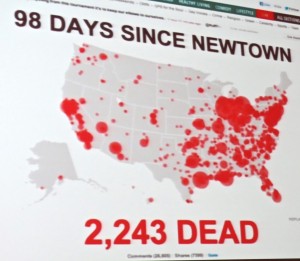 |
| Huffington Post Hack of the Month |
The result was a pretty scary map that showed just where gun-crazed Americans most like to kill themselves and others.
As more and more data migrates to the cloud, and more and more SMBs take advantage of this relatively hardware-less way to conduct business, Tribeca Cloud has found a way to “simplify and automate the process of discovering, deploying and managing open source platforms for web-based projects.” Not necessarily for my PR consultancy, but others were impressed by this full-service hosting company. And, yes, Amazon Web Services is in the mix somewhere.
One of the audience’s favorite presentations came from Brian Fountain of Magic Story Maker whose technology is based on the premise that toddlers and the like have no real interest in the literature you read to them every night. It’s simply a ploy on their part to stay up later. Here’s a short clip of his presentation opening.
His answer: an algorithm (I think) that turns the day’s news headlines into children’s stories. See below:
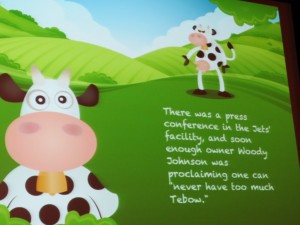 |
| A Page from Magic Story Maker |
Need I say more? Toward the end of the evening we heard from Cesar Kuriyama whose 1 Second Everyday approach to chronicling his own life on video led to a TED Talk, and other gratuitous self-aggrandizement. The audience loved it. He explained that he forgets what he did last week or last year and this way he’ll always remember. When the Q&A started, I held my tongue. I had but a single question for him. “Why?” Here’s the three-minute (180 second +/-) clip:
The final presenter was Micha Benoliel, a Frenchman. His mobile bandwidth saving/expanding app Open Garden allows anyone to borrow Internet access from those around him/her who also have the app. I asked from the audience whether the person from whom you’re borrowing will incur data charges. He didn’t exactly answer.
As I was leaving, I caught up with him on the steps leading out of the auditorium. I took the moment to ask if the borrower could achieve the bandwidth speed of the person from whom he/she is borrowing. He said that the data transfer rate is cumulative and that one can actually exceed the max bandwidth of the ISP. He then turned his back and blew me off. Ahhh, Les Francais.